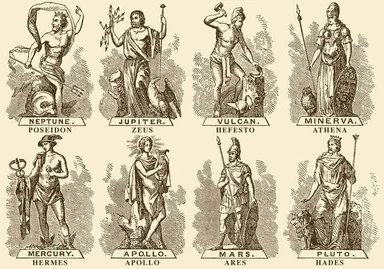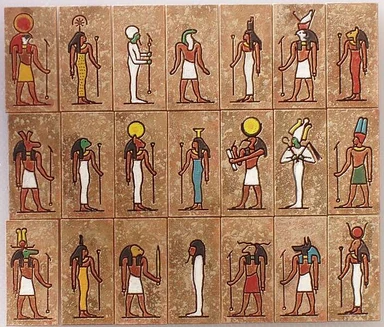
A selection of gods from the Greek Pantheon.
Gods (or sometimes Goddesses if feminine) are usually considered to be immortal, all-powerful beings. They are the principal objects of faith and often conceived as being supreme entities of creation. Conceptions of gods differ between religions and most religions that exist today believe in a single God that created the entire universe. Other religions believe in multiple gods that represent specific aspects of human existence.
There is much argument about the true nature of gods or if any such beings exist. Belief varies between considering a God, the one and only God or multiple Gods to be physical, almost mortal beings that perhaps simply have a higher level of intellect, intelligence and/or technological advancement, usually depicted as aliens or a higher race of people living somewhere beyond the reach of mere mortals, such as Heaven, Mount Olympus or Asgard; and considering one or more Gods to exist as omnipresent, omniscient life force(s) intrinsically linked to and inseparable from the soul and/or from every mote of existence in the universe or even multiverse. They may merely be figments of human imagination or be purely spiritual entities empowered by those who believe in them. They may even be something else entirely, something that is impossible for human beings to comprehend. The debate surrounding the existence and nature of such beings continues and will likely never be settled.

Egyptian gods.
Many gods and god-like beings have been conceived over the course of human existence and modern media has also led to the conception of other divine beings in different entertainment formats. Throughout history, entire religions have formed, been successful, believed in, fought for, usurped, subverted, used as excuses and as scapegoats, tried, forgotten, resurrected, subdivided, dismantled from every angle, criticised and sometimes just plain ignored. The vast majority of these religions have had something in common; the belief in the presence of a higher being or multiples thereof, ie. Gods. Notable exceptions (religions without a God as such) include Buddhism and Kopimism, although these religions usually allow members to still believe in one or more God(s) anyway if it does not impact their activities for these religions. The strength of belief in God(s) that can be formed has a profound effect on the perspectives of the religious, and many wars have been fought in and sometimes over the name or names of God(s) throughout and doubtlessly before recorded history.
